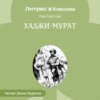Kitobni o'qish: «My Religion»
TRANSLATOR'S PREFACE
To one not familiar with the Russian language the accessible data relative to the external life of Leo Nikolaevich Tolstoi, the author of this book, are, to say the least, not voluminous. His name does not appear in that heterogeneous record of celebrities known as The Men of the Time, nor is it to be found in M. Vapereau's comprehensive Dictionnaire des Contemporains. And yet Count Leo Tolstoi is acknowledged by competent critics to be a man of extraordinary genius, who, certainly in one instance, has produced a masterpiece of literature which will continue to rank with the great artistic productions of this age.
Perhaps it is enough for us to know that he was born on his father's estate in the Russian province of Tula, in the year 1828; that he received a good home education and studied the oriental languages at the University of Kasan; that he was for a time in the army, which he entered at the age of twenty-three as an officer of artillery, serving later on the staff of Prince Gortschakof; and that subsequently he alternated between St. Petersburg and Moscow, leading the existence of super-refined barbarism and excessive luxury, characteristic of the Russian aristocracy. He saw life in country and city, in camp and court. He was numbered among the defenders of Sebastopol in the Crimean War, and the impressions then gathered he used as material for a series of War Sketches that attracted attention in the pages of the magazine where they first appeared; and when, a little later, they were published in book form, their author, then twenty-eight years of age, acquired at once a wide popularity. Popularity became fame with the publication, also in 1856, of Childhood and Youth, remarkable alike for its artless revelations concerning the genesis and growth of ideas and emotions in the minds of the young, for its idyllic pictures of domestic life, and for its graceful descriptions of nature. This was followed by The Cossacks, a wild romance of the steppes, vigorously realistic in details, and, like all of Count Tolstoi's works, poetic in conception and inspired with a dramatic intensity. In 1860 appeared War and Peace, an historical romance in many volumes, dealing with the Napoleonic invasion of 1812 and the events that immediately followed the retreat from Moscow. According to M. C. Courrière,1 it was seized upon with avidity and produced a profound sensation.
"The stage is immense and the actors are innumerable; among them three emperors with their ministers, their marshals, and their generals, and then a countless retinue of minor officers, soldiers, nobles, and peasants. We are transported by turns from the salons of St. Petersburg to the camps of war, from Moscow to the country. And all these diverse and varied scenes are joined together with a controlling purpose that brings everything into harmony. Each one of the prolonged series of constantly changing tableaux is of remarkable beauty and palpitating with life."
Pierre Besushkof, one of the three heroes of War and Peace, has, rightly or wrongly, long been regarded as in some respects an autobiographical study, but the personal note is always clearly perceptible in Count Tolstoi's writings, if we are to believe the reports of the enthusiastic purveyors of literary information who have made known some of their many attractive qualities. It is plain also that a common purpose runs through them all, a purpose which only in the author's latest production finds full expression. There are hints of it in Childhood and Youth; in War and Peace, and in a subsequent romance, Anna Karenin, it becomes very distinct. In the two works last named Count Tolstoi is pitiless in his portrayal of the vices and follies of the wealthy, aristocratic class, and warm in his praise of simplicity and unpretending virtue. Pierre Besushkof is represented as the product of a transition period, one who sees clearly that the future must be different from the past, but unable to interpret the prophecies of its coming. M. Courrière speaks of him very happily as "an overgrown child who seems to be lost in a wholly unfamiliar world." For a time Pierre finds mental tranquility in the tenets of freemasonry, and the author gives us a vivid account, humorous and pathetic by turns, of the young man's efforts to carry the newly acquired doctrines into practice. He determines to better the condition of the peasants on his estates; but instead of looking after the affair himself, he leaves the consummation of his plans to his stewards, with the result that "the cleverest among them listened with attention, but considered one thing only, – how to carry out their own private ends under the pretense of executing his commands." Later on we are shown Pierre wandering aimlessly about the streets of burning Moscow, until taken into custody by the French. Then he learns the true meaning of life from a simple soldier, a fellow-prisoner, and thereby realizes that safety for the future is to be obtained only by bringing life to the standard of rude simplicity adopted by the common people, by recognizing, in act as well as in deed, the brotherhood of man.
We cannot here enter into the question as to whether this mental attitude, by no means unusual among Russians of cultivation and liberality, arises from the lack of social gradation between the noble and the peasant, which forces the social philosopher of rank to accept an existence of pure worldliness and empty show, or to adopt the primitive aspirations and humble toil of the tillers of the soil. At any rate, it is plain that Count Tolstoi sides with the latter. The doctrine of simplification has many adherents in Russia, and when, some time ago, it was announced that the author of War and Peace had retired to the country and was leading a life of frugality and unaffected toil in the cultivation of his estates, the surprise to his own countrymen could not have been very great. In this book he tells us how the decision was formed. He bases his conclusions on a direct and literal interpretation of the teachings of Jesus as expressed in the Sermon on the Mount.
The interpretation is not new in theory, but never before has it been carried out with so much zeal, so much determination, so much sincerity, and, granting the premises, with logic so unanswerable, as in this beautiful confession of faith. How movingly does he depict the doubts and fears of the searcher after the better life; how impressive his earnest inquiry for truth; how inspiring his confidence in the natural goodness, as opposed to the natural depravity of man; how convincing his argument that the doctrine of Jesus is simple, practicable, and conducive to the highest happiness; how terrifying his enumeration of the sufferings of "the martyrs to the doctrine of the world"; how pitiless his arraignment of the Church for its complacent indifference to the welfare of humanity here in this present stage of existence; how sublime his prophecy of the golden age when men shall dwell together in the bonds of love, and sin and suffering shall be no more the common lot of mankind! We read, and are thrilled with a divine emotion; but which of us is willing to accept the truth here unfolded as the veritable secret of life?
Shall we take seriously this eloquent enunciation of faith in humility, in self-denial, in fraternal love, or shall we regard it only as a beautiful and peaceful phase in the career of a man of genius who, after the storm and stress of a life of sin and suffering, has turned back to the ideals of youth and innocence, and sought to make them once more the objects of desire? Fanaticism, do you say? Ah, yes; but did not Jesus and his disciples practise just such fanaticism as this? Does any one deny that all that is best in this modern world (and there is so much of the best, after all), that all that is best has come from the great moral impulse generated by a little group of fanatics in an obscure corner of Asia eighteen centuries ago? That impulse we still feel, in spite of all the obstructions that have been put in its way to nullify its action; and if any would seek for strength from the primary source of power, who shall say him nay? And so although we may smile at the artlessness of this Russian evangelist in his determination to find in the gospels the categorical imperative of self-renunciation, although we may regard with wonder the magnificent audacity of his exegetical speculations, we cannot refuse to admire a faith so sincere, so intense, and, in many respects, so elevating and so noble.
HUNTINGTON SMITH.
Dorchester, Mass.,
Nov. 19, 1885.
INTRODUCTION
I have not always been possessed of the religious ideas set forth in this book. For thirty-five years of my life I was, in the proper acceptation of the word, a nihilist, – not a revolutionary socialist, but a man who believed in nothing. Five years ago faith came to me; I believed in the doctrine of Jesus, and my whole life underwent a sudden transformation. What I had once wished for I wished for no longer, and I began to desire what I had never desired before. What had once appeared to me right now became wrong, and the wrong of the past I beheld as right. My condition was like that of a man who goes forth upon some errand, and having traversed a portion of the road, decides that the matter is of no importance, and turns back. What was at first on his right hand is now on his left, and what was at his left hand is now on his right; instead of going away from his abode, he desires to get back to it as soon as possible. My life and my desires were completely changed; good and evil interchanged meanings. Why so? Because I understood the doctrine of Jesus in a different way from that in which I had understood it before.
It is not my purpose to expound the doctrine of Jesus; I wish only to tell how it was that I came to understand what there is in this doctrine that is simple, clear, evident, indisputable; how I understand that part of it which appeals to all men, and how this understanding refreshed my soul and gave me happiness and peace.
I do not intend to comment on the doctrine of Jesus; I desire only that all comment shall be forever done away with. The Christian sects have always maintained that all men, however unequal in education and intelligence, are equal before God; that divine truth is accessible to every one. Jesus has even declared it to be the will of God that what is concealed from the wise shall be revealed to the simple. Not every one is able to understand the mysteries of dogmatics, homiletics, liturgics, hermeneutics, apologetics; but every one is able and ought to understand what Jesus Christ said to the millions of simple and ignorant people who have lived, and who are living to-day. Now, the things that Jesus said to simple people who could not avail themselves of the comments of Paul, of Clement, of Chrysostom, and of others, are just what I did not understand, and which, now that I have come to understand them, I wish to make plain to all.
The thief on the cross believed in the Christ, and was saved. If the thief, instead of dying on the cross, had descended from it, and told all men of his belief in the Christ, would not the result have been of great good? Like the thief on the cross, I believe in the doctrine of Jesus, and this belief has made me whole. This is not a vain comparison, but a truthful expression of my spiritual condition; my soul, once filled with despair of life and fear of death, is now full of happiness and peace.
Like the thief, I knew that my past and present life was vile; I saw that the majority of men about me lived unworthy lives. I knew, like the thief, that I was wretched and suffering, that all those about me suffered and were wretched; and I saw before me nothing but death to save me from this condition. As the thief was nailed to his cross, so I was nailed to a life of suffering and evil by an incomprehensible power. And as the thief saw before him, after the sufferings of a foolish life, the horrible shadows of death, so I beheld the same vista opening before me.
In all this I felt that I was like the thief. There was, however, a difference in our conditions; he was about to die, and I – I still lived. The dying thief thought perhaps to find his salvation beyond the grave, while I had before me life and its mystery this side the grave. I understood nothing of this life; it seemed to me a frightful thing, and then – I understood the words of Jesus, and life and death ceased to be evil; instead of despair, I tasted joy and happiness that death could not take away.
Will any one, then, be offended if I tell the story of how all this came about?
LEO TOLSTOI.
Moscow, Jan. 22, 1884.
CHAPTER I
I shall explain elsewhere, in two voluminous treatises, why I did not understand the doctrine of Jesus, and how at length it became clear to me. These works are a criticism of dogmatic theology and a new translation of the four Gospels, followed by a concordance. In these writings I seek methodically to disentangle everything that tends to conceal the truth from men; I translate the four Gospels anew, verse by verse, and I bring them together in a new concordance. The work has lasted for six years. Each year, each month, I discover new meanings which corroborate the fundamental idea; I correct the errors which have crept in, and I put the last touches to what I have already written. My life, whose final term is not far distant, will doubtless end before I have finished my work; but I am convinced that the work will be of great service; so I shall do all that I can to bring it to completion.
I do not now concern myself with this outward work upon theology and the Gospels, but with an inner work of an entirely different nature. I have to do now with nothing systematic or methodical, only with that sudden light which showed me the Gospel doctrine in all its simple beauty.
The process was something similar to that experienced by one who, following an erroneous model, seeks to restore a statue from broken bits of marble, and who with one of the most refractory fragments in hand perceives the hopelessness of his ideal; then he begins anew, and instead of the former incongruities he finds, as he observes the outlines of each fragment, that all fit well together and form one consistent whole. That is exactly what happened to me, and is what I wish to relate. I wish to tell how I found the key to the true meaning of the doctrine of Jesus, and how by this meaning doubt was absolutely driven from my soul. The discovery came about in this way.
From my childhood, from the time I first began to read the New Testament, I was touched most of all by that portion of the doctrine of Jesus which inculcates love, humility, self-denial, and the duty of returning good for evil. This, to me, has always been the substance of Christianity; my heart recognized its truth in spite of scepticism and despair, and for this reason I submitted to a religion professed by a multitude of toilers, who find in it the solution of life, – the religion taught by the Orthodox Church. But in making my submission to the Church, I soon saw that I should not find in its creed the confirmation of the essence of Christianity; what was to me essential seemed to be in the dogma of the Church merely an accessory. What was to me the most important of the teachings of Jesus was not so regarded by the Church. No doubt (I thought) the Church sees in Christianity, aside from its inner meaning of love, humility, and self-denial, an outer, dogmatic meaning, which, however strange and even repulsive to me, is not in itself evil or pernicious. But the further I went on in submission to the doctrine of the Church, the more clearly I saw in this particular point something of greater importance than I had at first realized. What I found most repulsive in the doctrine of the Church was the strangeness of its dogmas and the approval, nay, the support, which it gave to persecutions, to the death penalty, to wars stirred up by the intolerance common to all sects; but my faith was chiefly shattered by the indifference of the Church to what seemed to me essential in the teachings of Jesus, and its partiality for what seemed to me of secondary importance. I felt that something was wrong; but I could not see where the fault lay, because the doctrine of the Church did not deny what seemed to me essential in the doctrine of Jesus; this essential was fully recognized, yet in such a way as not to give it the first place. I could not accuse the Church of denying the essence of the doctrine of Jesus, but it was recognized in a way which did not satisfy me. The Church did not give me what I expected from her. I had passed from nihilism to the Church simply because I felt it to be impossible to live without religion, that is, without a knowledge of good and evil aside from animal instincts. I hoped to find this knowledge in Christianity; but Christianity I then saw only as a vague spiritual tendency, from which it was impossible to deduce any clear and peremptory rules for the guidance of life. These I sought and these I demanded of the Church. The Church offered me rules wherein I not only sought in vain the practice of the Christian life so dear to me, but which drove me still further away. I could not become a disciple of the Church. An existence based upon Christian truth was to me indispensable, and the Church only offered me rules completely at variance with the truth that I loved. The rules of the Church touching articles of faith, dogmas, the observance of the sacrament, fasts, prayers, were not necessary to me, and did not seem to be based on Christian truth. Moreover, the rules of the Church weakened and sometimes destroyed the Christian disposition of soul which alone gave meaning to my life.
I was troubled most that the miseries of humanity, the habit of judging one another, of passing judgment upon nations and religions, and the wars and massacres which resulted in consequence, all went on with the approbation of the Church. The doctrine of Jesus, – judge not, be humble, forgive offences, deny self, love, – this doctrine was extolled by the Church in words, but at the same time the Church approved what was incompatible with the doctrine. Was it possible that the doctrine of Jesus admitted of such contradiction? I could not believe so.
Another astonishing thing about the Church was that the passages upon which it based affirmation of its dogmas were those which were most obscure. On the other hand, the passages from which came the moral laws were the most clear and precise. And yet the dogmas and the duties depending upon them were definitely formulated by the Church, while the recommendation to obey the moral law was put in the most vague and mystical terms. Was this the intention of Jesus? The Gospels alone could dissipate my doubts. I read them once and again.
Of all the other portions of the Gospels, the Sermon on the Mount always had for me an exceptional importance. I now read it more frequently than ever. Nowhere does Jesus speak with greater solemnity, nowhere does he propound moral rules more definitely and practically, nor do these rules in any other form awaken more readily an echo in the human heart; nowhere else does he address himself to a larger multitude of the common people. If there are any clear and precise Christian principles, one ought to find them here. I therefore sought the solution of my doubts in Matthew v., vi., and vii., comprising the Sermon on the Mount. These chapters I read very often, each time with the same emotional ardor, as I came to the verses which exhort the hearer to turn the other cheek, to give up his cloak, to be at peace with all the world, to love his enemies, – but each time with the same disappointment. The divine words were not clear. They exhorted to a renunciation so absolute as to entirely stifle life as I understood it; to renounce everything, therefore, could not, it seemed to me, be essential to salvation. And the moment this ceased to be an absolute condition, clearness and precision were at an end.
I read not only the Sermon on the Mount; I read all the Gospels and all the theological commentaries on the Gospels. I was not satisfied with the declarations of the theologians that the Sermon on the Mount was only an indication of the degree of perfection to which man should aspire; that man, weighed down by sin, could not reach such an ideal; and that the salvation of humanity was in faith and prayer and grace. I could not admit the truth of these propositions. It seemed to me a strange thing that Jesus should propound rules so clear and admirable, addressed to the understanding of every one, and still realize man's inability to carry his doctrine into practice.
Then as I read these maxims I was permeated with the joyous assurance that I might that very hour, that very moment, begin to practise them. The burning desire I felt led me to the attempt, but the doctrine of the Church rang in my ears, —Man is weak, and to this he cannot attain; – my strength soon failed. On every side I heard, "You must believe and pray"; but my wavering faith impeded prayer. Again I heard, "You must pray, and God will give you faith; this faith will inspire prayer, which in turn will invoke faith that will inspire more prayer, and so on, indefinitely." Reason and experience alike convinced me that such methods were useless. It seemed to me that the only true way was for me to try to follow the doctrine of Jesus.
And so, after all this fruitless search and careful meditation over all that had been written for and against the divinity of the doctrine of Jesus, after all this doubt and suffering, I came back face to face with the mysterious Gospel message. I could not find the meanings that others found, neither could I discover what I sought. It was only after I had rejected the interpretations of the wise critics and theologians, according to the words of Jesus, "Except ye… become as little children, ye shall not enter into the kingdom of heaven" (Matt. xviii. 3), – it was only then that I suddenly understood what had been so meaningless before. I understood, not through exegetical fantasies or profound and ingenious textual combinations; I understood everything, because I put all commentaries out of my mind. This was the passage that gave me the key to the whole: —
"Ye have heard that it hath been said, An eye for an eye, and a tooth for a tooth: But I say unto you, That ye resist not evil." (Matt. v. 38, 39.)
One day the exact and simple meaning of these words came to me; I understood that Jesus meant neither more nor less than what he said. What I saw was nothing new; only the veil that had hidden the truth from me fell away, and the truth was revealed in all its grandeur.
"Ye have heard that it hath been said, An eye for an eye, and a tooth for a tooth: But I say unto you, That ye resist not evil."
These words suddenly appeared to me as if I had never read them before. Always before, when I had read this passage, I had, singularly enough, allowed certain words to escape me, "But I say unto you, that ye resist not evil." To me it had always been as if the words just quoted had never existed, or had never possessed a definite meaning. Later on, as I talked with many Christians familiar with the Gospel, I noticed frequently the same blindness with regard to these words. No one remembered them, and often in speaking of this passage, Christians took up the Gospel to see for themselves if the words were really there. Through a similar neglect of these words I had failed to understand the words that follow: —
"But whosoever shall smite thee on thy right cheek, turn to him the other also," etc. (Matt. v. 39, et seq.)
Always these words had seemed to me to demand long-suffering and privation contrary to human nature. They touched me; I felt that it would be noble to follow them, but I also felt that I had not the strength to put them into practice. I said to myself, "If I turn the other cheek, I shall get another blow; if I give, all that I have will be taken away. Life would be an impossibility. Since life is given to me, why should I deprive myself of it? Jesus cannot demand as much as that." Thus I reasoned, persuaded that Jesus, in exalting long-suffering and privation, made use of exaggerated terms lacking in clearness and precision; but when I understood the words "Resist not evil," I saw that Jesus did not exaggerate, that he did not demand suffering for suffering, but that he had formulated with great clearness and precision exactly what he wished to say.
"Resist not evil," knowing that you will meet with those who, when they have struck you on one cheek and met with no resistance, will strike you on the other; who, having taken away your coat, will take away your cloak also; who, having profited by your labor, will force you to labor still more without reward. And yet, though all this should happen to you, "Resist not evil"; do good to them that injure you. When I understood these words as they are written, all that had been obscure became clear to me, and what had seemed exaggerated I saw to be perfectly reasonable. For the first time I grasped the pivotal idea in the words "Resist not evil"; I saw that what followed was only a development of this command; I saw that Jesus did not exhort us to turn the other cheek that we might endure suffering, but that his exhortation was, "Resist not evil," and that he afterward declared suffering to be the possible consequence of the practice of this maxim.
A father, when his son is about to set out on a far journey, commands him not to tarry by the way; he does not tell him to pass his nights without shelter, to deprive himself of food, to expose himself to rain and cold. He says, "Go thy way, and tarry not, though thou should'st be wet or cold." So Jesus does not say, "Turn the other cheek and suffer." He says, "Resist not evil"; no matter what happens, "Resist not."
These words, "Resist not evil," when I understood their significance, were to me the key that opened all the rest. Then I was astonished that I had failed to comprehend words so clear and precise.
"Ye have heard that it hath been said, An eye for an eye, and a tooth for a tooth: But I say unto you, That ye resist not evil."
Whatever injury the evil-disposed may inflict upon you, bear it, give all that you have, but resist not. Could anything be more clear, more definite, more intelligible than that? I had only to grasp the simple and exact meaning of these words, just as they were spoken, when the whole doctrine of Jesus, not only as set forth in the Sermon on the Mount, but in the entire Gospels, became clear to me; what had seemed contradictory was now in harmony; above all, what had seemed superfluous was now indispensable. Each portion fell into harmonious unison and filled its proper part, like the fragments of a broken statue when adjusted in harmony with the sculptor's design. In the Sermon on the Mount, as well as throughout the whole Gospel, I found everywhere affirmation of the same doctrine, "Resist not evil."
In the Sermon on the Mount, as well as in many other places, Jesus represents his disciples, those who observe the rule of non-resistance to evil, as turning the other cheek, giving up their cloaks, persecuted, used despitefully, and in want. Everywhere Jesus says that he who taketh not up his cross, he who does not renounce worldly advantage, he who is not ready to bear all the consequences of the commandment, "Resist not evil," cannot become his disciple.
To his disciples Jesus says, Choose to be poor; bear all things without resistance to evil, even though you thereby bring upon yourself persecution, suffering, and death.
Prepared to suffer death rather than resist evil, he reproved the resentment of Peter, and died exhorting his followers not to resist and to remain always faithful to his doctrine. The early disciples observed this rule, and passed their lives in misery and persecution, without rendering evil for evil.
It seems, then, that Jesus meant precisely what he said. We may declare the practice of such a rule to be very difficult; we may deny that he who follows it will find happiness; we may say with the unbelievers that Jesus was a dreamer, an idealist who propounded impracticable maxims; but it is impossible not to admit that he expressed in a manner at once clear and precise what he wished to say; that is, that according to his doctrine a man must not resist evil, and, consequently, that whoever adopts his doctrine will not resist evil. And yet neither believers nor unbelievers will admit this simple and clear interpretation of Jesus' words.




















